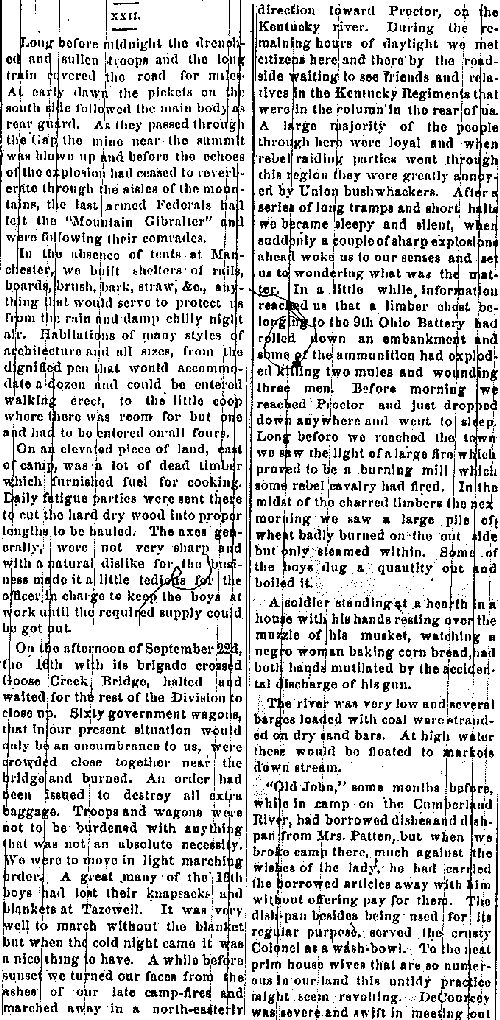| Camp & Field Page 38 | Camp & Field Index Page | 16th OVI Home Page | Camp & Field Page 38C |
The Camp & FieldArticles by Theodore Wolbach |
 Cpl. Theodore D. Wolbach |
The following image is taken from a book titled "Mortality and Statistics of the Census of 1850" in which it is believed retired Captain Rezin H. Vorhes, Company H, pasted over the pages a series of articles written by Cpl. Theodore D. Wolbach, Company E, titled "Camp and Field" and published, by chapter, in the Holmes County (Ohio) Republican newspaper from February 24, 1881 to August 17, 1882. The articles tell the story, in great detail and color, of the 16th OVI, from the inception of the 3-year regiment in October, 1861, through all its camps, battles and marches until it was disbanded on October 31, 1864. The articles pasted in the Vorhes book cover the first 35 chapters, published through October 20, 1881. All the remaining chapters were recently found in a Holmes County library by researcher Rob Garber who obtained copies, performed the transcriptions and provided to this website and which are also presented here, thus providing the complete work by Theodore Wolbach.
Throughout these articles click on the underlined white text for additional details.
The webauthor thanks 16th Ohio descendant Rob Garber for his excellent research on the Camp And Field articles and for performing the tedious digital transcription of those articles found on each page. The transcriptions were made to reflect the original articles verbatim, misspellings and all. Rob is the 3rd great nephew of Capt. William Buchanan, Company F, 16th Ohio, who served in the 90-day regiment as a private, re-enlisting in the three year regiment, and eventually making the rank of Captain of Company F. Thanks Rob!
Page 38B - Chapter 22 - September, 1862
 |
Published in Holmes County Republican XXII. Long before midnight the drenched and sullen troops and the long train covered the road for miles. At early dawn the pickets on the south side followed the main body as rear guard. As they passed through the Gap the mine near the summit was blown up and before the echoes of the explosion had ceased to reverberate through the aisles of the mountains, the last armed Federals had left the In the absence of tents at Manchester, we built shelters of rails, boards, brush, bark, straw, &c., anything that would serve to protect from the rain and damp chilly night air. Habitations of many styles of architecture and all sizes, from the dignified pen that would accommodate a dozen and could be entered walking erect, to the little coop where there was room for but one and had to be entered on all fours. On an elevated piece of land, east of camp, was a lot of dead timber which furnished fuel for cooking. Daily fatigue parties were sent there to cut the hard dry wood into proper lengths to be hauled. The axes generally, were not very sharp and with a natural dislike for the business made it a little tedious for the officer in charge to keep the boys at work until the required supply could be got to. On the afternoon of September 22d, the 16th with its brigade crossed Goose Creek Bridge, halted and waited for the rest of the Division to close up. Sixty government wagons, that in our present situation would only be an encumbrance to us, were crowded close together near the bridge and burned. An order had been issued to destroy all extra baggage. Troops and wagons were not to be burdened with anything that was not an absolute necessity. We were to move in light marching order. A great many of the 16th boys had lost their knapsacks and blankets at Tazewell. It was very well to march without the blanket but when the cold night came it was a nice thing to have. A while before sunset we turned our faces from the ashes of our late camp-fires and marched away in a north-easterly |
direction toward Proctor, on the Kentucky river. During the remaining hours of daylight we met citizens here and there by the roadside waiting to see friends and relatives in the Kentucky Regiments that were in the column in the rear of us. A large majority of the people through here were loyal and when rebel raiding parties went through this region they were greatly annoyed by Union bushwhackers. After a series of long tramps and short halts we became sleepy and silent, when suddenly a couple of sharp explosions ahead woke us to our senses and set us to wondering what was the matter. In a little while, information reached us that a limber choat belonging to the 9th Ohio Battery had rolled down an embankment and some of the ammunition had exploded killing two mules and wounding three men. Before morning we reached Proctor and just dropped down anywhere and went to sleep. Long before we reached the town we saw the light of a large fire which proved to be a burning mill which some rebel cavalry had fired. In the midst of the charred timbers the next morning we saw a large pile of wheat badly burned on the out side but only steamed within. Some of the boys dug a quantity out and boiled it. A soldier standing at a hearth in a house with his hands resting over the muzzle of his musket, watching a negro woman baking corn bread, had both hands mutilated by the accidental discharge of his gun. The river was very low and several barges loaded with coal were stranded on dry sand bars. At high water these would be floated to markets down stream. |
| Camp & Field Page 38 | Camp & Field Index Page | 16th OVI Home Page | Camp & Field Page 38C |